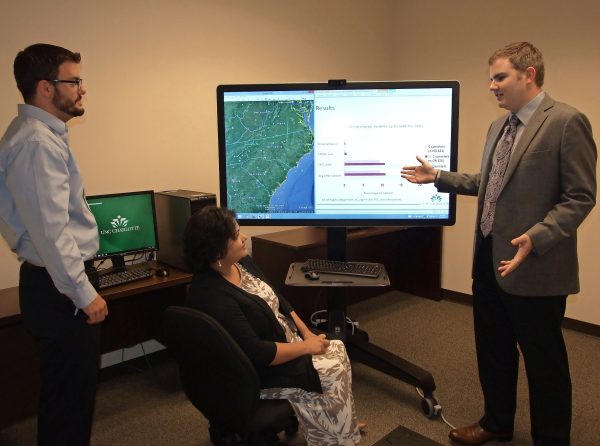Big Data: A New Frontier in Health Services Research and for CHHS

Traditional health services research begins with a hypothesis based on things that are already known. The hypothesis is then tested in pilot phases with animals, single cases or small programs and, if the findings are positive, larger investments are made on the magnitude of human trials, registries or systems integration. The end goal is to determine the viability of the hypothesis in a population. With access to big data, however, a completely new approach to research has emerged–researchers are able to start their study by looking at the population level to examine health trends, letting the data tell us which patient characteristics are most closely associated with beneficial health outcomes.
“The College of Health and Human Services is ready to engage in this new approach to decision making in health care, with the ultimate goal of improving the health of individuals and groups in our community,” says Dean Nancy Fey-Yensan. “The Data Science and Business Analytics (DSBA) program is a unique, multi-college initiative working to bring together technologies and researchers to cultivate these big data opportunities at UNC Charlotte, and we are so pleased to welcome Dr. Christopher Blanchette as Director for the College’s emerging DSBA initiative.”
Dr. Blanchette has over 12 years of research experience with large data sets in different settings, including pharmaceutical companies, consultant firms, and academia. As the CHHS DSBA Director, he is tasked with building a new infrastructure to help faculty and students embrace big data and to integrate it into their work. Besides working across departments and Colleges at the UNC Charlotte, Dr. Blanchette reaches out to business, industry and the health and human service community to help them focus on the value of big data in the provision of care to a wide variety of clients and patients. Importantly, Chris is sending the message that UNC Charlotte and the College of Health and Human Services’ faculty and graduate students are experienced and ready partners in the big data realm. “We are ideally suited to be a strong partner to healthcare organizations because of our depth of knowledge of Big Data analysis as well as our first hand understanding of the critical health-related questions that these organizations need answers to.”
Under Dr. Blanchette’s leadership, CHHS researchers are utilizing Electronic Medical Records, administrative billing claims, surveys and social media data to create a platform that looks at exposures and outcomes within populations. The information gathered through these analyses provides insights that can lead to the delivery of more efficient and effective healthcare. One DSBA research team is working on geo-coding (physically locating as in town or by zip code) hospital readmissions across North Carolina using data from the Health Care Utilization Project (HCUP), a nationwide sample of inpatient admissions that allows for linking episodes of care across visits. The team will be assessing waste as a result of readmissions within 30 days (a marker of poor quality of care) and estimating lost revenues for North Carolina facilities as a result of new legislation mandating reduced payments for these readmissions from the Center for Medicare and Medicaid Services, the federal entity that pays for hospitalizations. Healthcare delivery systems and hospitals are very interested in these findings because it provides them insight into their own potential revenue impact as well as other hospital utilization trends.
“It is always in the patient’s and the hospital’s interest to prevent re-admission,” says Dr. Blanchette. “By deeply examining the data, we can track hospital utilization and identify which types of patients may be more likely to be re-admitted so we can focus attention on these groups and how to keep them healthy and in the community.”
The CHHS DBSA research team, already producing results, will present some of their findings at the national American Public Health Association conference this November.